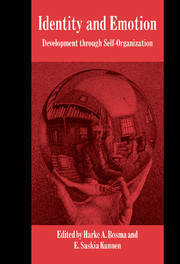Book contents
- Frontmatter
- Contents
- List of contributors
- Preface
- 1 Introduction
- 2 Developments in self-concept theory and research: affect, context, and variability
- Commentary: the self-concept is dead, long live … which construct or process? Differentiation and organization of self-related theories
- 3 The self and emotions
- Commentary: the self and emotions
- 4 Fish, foxes, and talking in the classroom: introducing dynamic systems concepts and approaches
- Commentary: fish, foxes, identity, and emotion
- 5 A relational perspective on the development of self and emotion
- Commentary: the personal experience of coherence
- 6 Affective processes in a multivoiced self
- Commentary: affective processes in a multivoiced self in action
- 7 Old–new answers and new-old questions for personality and emotion: a matter of complexity
- Commentary: emotions as sources of information about the self
- 8 Cognitive–emotional self-organization in personality development and personal identity
- Commentary: two faces of identity
- 9 A self-organizational approach to identity and emotions: an overview and implications
- References
- Author index
- Subject index
- Titles in the series
Commentary: the self and emotions
Published online by Cambridge University Press: 28 October 2009
- Frontmatter
- Contents
- List of contributors
- Preface
- 1 Introduction
- 2 Developments in self-concept theory and research: affect, context, and variability
- Commentary: the self-concept is dead, long live … which construct or process? Differentiation and organization of self-related theories
- 3 The self and emotions
- Commentary: the self and emotions
- 4 Fish, foxes, and talking in the classroom: introducing dynamic systems concepts and approaches
- Commentary: fish, foxes, identity, and emotion
- 5 A relational perspective on the development of self and emotion
- Commentary: the personal experience of coherence
- 6 Affective processes in a multivoiced self
- Commentary: affective processes in a multivoiced self in action
- 7 Old–new answers and new-old questions for personality and emotion: a matter of complexity
- Commentary: emotions as sources of information about the self
- 8 Cognitive–emotional self-organization in personality development and personal identity
- Commentary: two faces of identity
- 9 A self-organizational approach to identity and emotions: an overview and implications
- References
- Author index
- Subject index
- Titles in the series
Summary
In order to properly examine the relation between emotions and the self-concept, Frijda believes it is necessary to distinguish between the self as object of knowledge and the transcendental self. He makes a compelling case for the importance of the self as object of knowledge, but I have trouble understanding exactly what he means by the transcendental self. At one point he defines it as “the sum total of the information processes at a functional level” and at another as a person's “set of concerns.” These are both vague constructs that require clarification, and, unless I am missing something, they are not even the same.
Others, as well as I, have proposed more clearly articulated distinctions between two somewhat similar constructs to the ones proposed by Frijda. For example, William James (1910) initially, and Gordon Allport (1955) later, expressed the difference between the two selves in terms of the self as an object of knowledge and the self as an executive self that is the source of behavior. Both, however, eventually disowned the executive self as scientifically indefensible, likening it to a homunculus residing inside a person's head and directing the person's behavior. The problem with the executive self and its homunculus analogy is that understanding their behavior is no simpler than understanding the behavior of the whole person and therefore does nothing to further our understanding. I will discuss a more meaningful representation of the executive self later, when I present my own views.
- Type
- Chapter
- Information
- Identity and EmotionDevelopment through Self-Organization, pp. 58 - 63Publisher: Cambridge University PressPrint publication year: 2001
- 1
- Cited by



